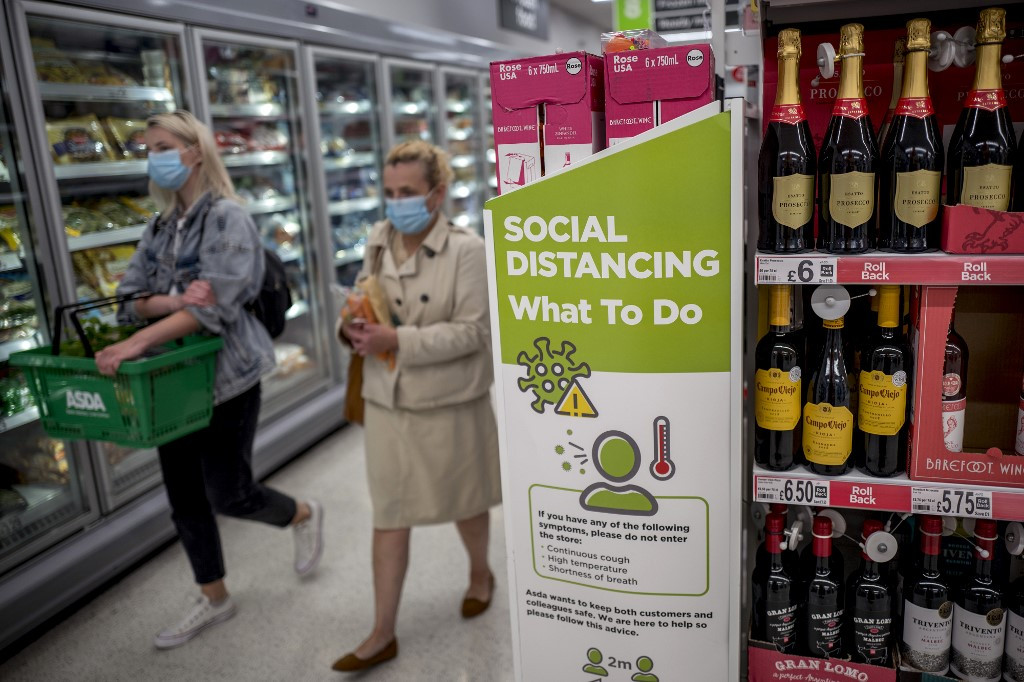UK retail warns shoppers face higher prices if no EU trade deal
Change Size
 Shoppers wearing PPE (personal protective equipment), of a face mask or covering as a precautionary measure against spreading COVID-19,, walk past a banner advising customers to maintain the British government's current social distancing guidelines and stay two metres (2M) apart, inside an Asda supermarket store in Walthamstow, east London on June 22, 2020. - Britain's current social distancing guidelines set the distance between each person at two metres to avoid the risk of contamination to coronavirus. There is pressure on the government to reduce this distance in order to give a boost to bars, restaurants and hotels, which are scheduled to reopen next month. (AFP/Tolga AKMEN )
Shoppers wearing PPE (personal protective equipment), of a face mask or covering as a precautionary measure against spreading COVID-19,, walk past a banner advising customers to maintain the British government's current social distancing guidelines and stay two metres (2M) apart, inside an Asda supermarket store in Walthamstow, east London on June 22, 2020. - Britain's current social distancing guidelines set the distance between each person at two metres to avoid the risk of contamination to coronavirus. There is pressure on the government to reduce this distance in order to give a boost to bars, restaurants and hotels, which are scheduled to reopen next month. (AFP/Tolga AKMEN )
B
ritain’s retail industry on Friday urged UK and European negotiators to reach a post-Brexit trade deal, warning that without tariff-free trade, consumers face higher prices from next year.
The sector has already announced thousands of job losses due the coronavirus pandemic as wary shoppers stay away from the high street, and the next stage of the Brexit process poses a further challenge.
Britain left the EU in January and is currently in a standstill transition period with the bloc to give the two sides time to fix a new relationship in everything from trade to security.
Last week’s round of talks was cut short, with both sides saying that, while they wanted an agreement, they had yet to overcome the gulf in positions that could see Britain leaving the transition period without a trade deal.
Four-fifths of UK food imports come from the EU and EU imports also play a major role in supply chains for fashion, homeware, and other retail sectors.
In May, the UK government published its new tariff schedule, which would apply from Jan. 1 2021 if a deal was not agreed.
Under the schedule, 85 percent of foods imported from the EU will face tariffs of more than 5 percent, including 48 percent on beef mince and 16 percent on cucumbers. The average tariff on food imported from the EU would be over 20 percent.
Given the highly competitive nature of retail, the industry could not absorb all these increased costs, meaning the public would face higher prices, the British Retail Consortium (BRC) said.
“Many UK shoppers experienced disruption in the run up to (coronavirus) lockdown; without a deal, the public may face an even bigger challenge at the end of the transition period,” said Andrew Opie, the BRC’s director of food and sustainability.
“With the clock ticking down to 31st December, the government must put consumers first and agree a deal that avoids tariffs and minimises the impact of non-tariff barriers.”
UK retailers, already struggling with high rents, business taxes, tight margins and online competition, were particularly hammered by the lockdown and data shows shoppers are reluctant to enter stores even as restrictions ease.









